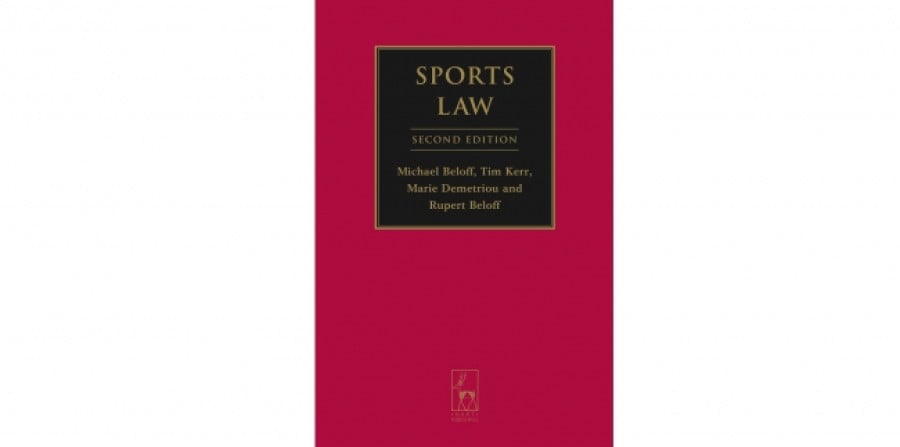Book Review - SPORTS LAW (SECOND EDITION 2012)
Thursday, 12 March 2015SPORTS LAW (SECOND EDITION 2012), by Michael Beloff, QC, Tim Kerr, QC, Maria Demetriou, and Rupert Beloff, published by Hart Publishing, Oxford and Portland, Oregon, hardback, ISBN 978-1-84113-367-6 £100.00.
When a classic, made so in its first edition, is revised for its second edition thirteen years later, it leaves one to wonder how it could possibly account for the tremendous development of events that must have transpired during the intervening years. In the relatively young field of sports law, the past thirteen years have seen dramatic growth in the business of sport and in the body of law surrounding and emanating from it. And the first edition was the classic work in a subject that was largely in its infancy in 1999. So it was with great curiosity that I immersed myself in the most modern edition of Michael Beloff, et al.’s “Sports Law”.
Absent from this edition is any discussion of the background or biography of the authors, each of whom is a superstar sports lawyer in his or her own right. Perhaps this absence exists because these authors are simply such heavyweights in their field that the mere mention of their name is all that is required to give authority to the expertise imbued in their writing.
I have come to know Michael Beloff, QC, of Blackstone Chambers, from serving with him as an arbitrator with the Court of Arbitration for Sport across several cases. We have not always agreed on the outcomes, but we have always agreed on the bases for the decisions that we have rendered, even on those cases where we disagreed on the outcomes. He is a formidable advocate for his cause, and an even more formidable arbitrator. Many consider him, as former Chairman of the British Association for Sport and Law, rightfully so, to be the dean of the sports law bar in the United Kingdom. One must approach this volume with sufficient respect for the eminence gris represented by his lead authorship.
His co-authors are similarly distinguished. Tim Kerr, QC, of 11 Kings Bench Walk, is an accomplished barrister, and Chancery civil recorder, who regularly sits as an arbitrator or hearing officer in sports cases before the Football Association and the International Tennis Federation. Marie Demetriou, QC, of Brick Court Chambers, is an expert barrister advocating before and under the law of the EU. Rounding out this group is Rupert Beloff, a barrister at No. 5 Chambers with extensive sports and media law disputes and advisory experience.
Enough wind up and time to move the ball upfield.
Sports Law is 313 pages long, exclusive of very comprehensive tables of contents, abbreviations, and authorities, a detailed bibliography, and a comprehensive index. The index of Court of Arbitration for Sport cases cited is a veritable what’s what listing of the most significant CAS cases in history. The book’s modest size belies its completeness and significance in the hierarchy of publications covering the lex sportiva. The first edition was introduced by Sir Roger Bannister’s foreword, and, not to be outdone, the second edition’s foreword has Lord Coe, KBE, as its author.
This volume does not attempt to be more than it purports to be. The authors are clear and express in their opening chapter that the purpose of the book is to provide a basic theoretical foundation of the law governing sports that will appeal to both lawyers and non-lawyers alike.
The book is simply and clearly organized along three fundamental lines.
The first, the pre-competition phase, introduces the reader to the relevant institutions, their rules, and their relationships with each other and the various participants in sport.
The second, covers the rules of the game, including the rules covering sponsorship and commercial exploitation of sport, and the application of tort and criminal law to sport participants, spectators, and institutions.
The third, addresses the application of discipline to rule violators, such as issues arising from doping, match fixing, misconduct, and other transgressions, and goes on to discuss various dispute resolution mechanisms, including in particular those provided by the Court of Arbitration for Sport.
While the primary focus of this volume is on domestic English law, the international perspective is brought to bear insofar as there is discussion of EU law governing sport and the lex sportiva generated by the Court of Arbitration for Sport.
Its lengthy chapter covering disciplinary proceedings in sports may well be the most complete exposition attempted of this topic, covering the field with great detail, at least under English law. Similarly, its chapter on dispute resolution in sports, focused on disputed proceedings like arbitration rather than mediation, across many different sport structures is comprehensive in scope, yet sufficiently perfunctory to be approachable to any reader, while raising the relevant points. The book gives relatively summary treatment of the rules governing doping issues, providing a mere 5 pages of discussion out of its total 346 pages, though it hits the high points.
Refreshing about this book is its absence of advocacy for a particular position, instead providing the reader with a balanced overview of a topic without any particular slant. This is as things should be.
This volume is as much a good entry point for new sports practitioners, whether legally qualified or not, as it is an excellent reference for more experienced sports executives, lawyers, and professors. It is approachable, portable, and comprehensive. I highly commend it as a volume that should be required reading and rest on the relevant shelves to round out the panoply of top sports law books in England, if not the world. I intend to keep it close, open it often, and use excerpts in my own sports law teaching.
JEFFREY G. BENZ
4 New Square (London)
Benz Law (Los Angeles)

 Global Summit 2024
Global Summit 2024